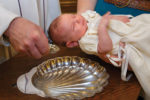 |
Am I really a saint?
It’s that time of year again: The leaves are changing, pumpkin spice is in everything, and the church year is drawing to a close. As Reformation celebrations wrap up, we turn our attention to All Saints’ Day, typically celebrated on Nov. 1 or the first Sunday in November. The intent of All Saints’ Day is to remember the believers who went before us, died in the faith, and now enjoy the unending bliss of heaven.
Who is a saint?
But who exactly is a saint? Maybe your mind jumps to a person who lived a particularly virtuous life or a long-suffering person (as in “She’s a saint for marrying that guy”). Maybe you picture a believer who has died or a famous believer with a church named after him, such as Saint Paul. But that’s not actually how the Bible defines a saint.
In the New Testament, the Greek word translated as “saint” is hagios, which means “holy one.” So quite simply, a saint is a holy person. The first reading for All Saints’ Day, Revelation 7:9-17, explains why believers in heaven are perfect and holy: “They have washed their robes and made them white in the blood of the Lamb” (v. 14). Believers in heaven are holy thanks to the redeeming work of Jesus, the Lamb of God, and are rightly called saints.
It gets better, though, because saints aren’t just believers in heaven. When Scripture uses the word saint, it is most often referring to believers who are still alive on earth. In some Bible translations, the books of Romans, 2 Corinthians, Ephesians, and Philippians are addressed to “the saints” in those churches. Colossians chapter 1, Philemon verse 5, Jude verse 3, and Acts chapter 9 refer to believers on earth as saints. So when we speak of saints, we can echo Scripture’s usage and use the term to refer to both believers in heaven and believers on earth. Even though you and I must wait to experience many of heaven’s joys, the triumph of sainthood is something we get to enjoy right now.
Me, a saint?
But wait, you might think. How exactly does that work? Am I, a person who regularly confesses that I have sinned in my thoughts, words, and actions, really a holy person? Am I, a person who is sinful by nature, actually a saint?
Yes, gentle reader, you are indeed a saint. You are a holy person not because you act so holy, but because God has declared you holy. You are a saint because Jesus removed your sins and made you holy. That truth is the beating heart of Lutheran teaching.
This beautiful truth is detailed in 2 Corinthians 5:21: “God made him who had no sin to be sin for us, so that in him we might become the righteousness of God.” Before God stepped in, we were totally sinful and completely unholy, while Christ Jesus was totally sinless and completely holy. But God orchestrated a great exchange: our sinfulness for Christ’s holiness.
Christ Jesus took our sins and made them his own. He gave you his holiness and made it your own. Because of this great exchange, God looks at you and sees only Jesus’ holiness. That means you—yes, you!—are indeed a saint, because you are a person made holy by Jesus.
Saint and sinner
But sometimes the doubts come creeping in. Maybe the sins of your past make you wonder how holy you actually are. Maybe the sins of your present make you question how saintly you really are. Maybe your attempts at saintly living fail in an embarrassingly short amount of time and your sins feel like they will outweigh, overpower, and overshadow the holiness Christ has given you. The Bible says I’m a saint . . . but am I really a saint?
If you ever think like that, you’re not alone. Believers across the ages have wrestled with similar thoughts. There’s a reason for that. It’s because here on earth believers are at the same time saint and sinner. Yes, God has forgiven our sins thanks to Jesus’ life and death in our place, but we still have a sinful nature to contend with. Yes, Jesus has given us his holiness as a gift of grace, but temptations still assault us in this life. Since Christians are both saints and sinners in this life, there will be times when we think, speak, and act more like saints and times when we think, speak, and act more like sinners.
So how can we live more like saints and less like sinners? First, remember how we live more like saints. It doesn’t happen through trying harder, being better, or completing a self-improvement plan. Living as God’s holy person is the work of the Holy Spirit. Think of Martin Luther’s explanation of the Third Article of the Apostles’ Creed: “The Holy Spirit has called me by the gospel, enlightened me with his gifts, sanctified and kept me in the true faith” (emphasis added). You can’t separate sanctification, or living like the holy person God has declared you to be, from the work of the Holy Spirit.
The Holy Spirit’s work is to make people holy by planting faith in their hearts and strengthening them to live that faith every day. We sin often, regularly, and repeatedly. So we need the Spirit’s help often, regularly, and repeatedly. And that’s what the Spirit does: He strengthens us to live as the saints we are. He empowers and motivates us to live as God’s holy people. With the Spirit’s daily help, we learn to resist temptations, flee from sin, and say no to sinful desires.
Second, give the Holy Spirit opportunities to work. The Holy Spirit works through the means of grace, which is the gospel in Word and sacraments. Stay connected to those means of grace! Prioritize the spiritual nourishment you receive at church. Partake of Holy Communion regularly. Remember your baptism daily and recall what God gave you at the font: new life, forgiveness, and salvation. Make God’s Word part of your rhythm at home. Family devotions, personal Bible reading, and Scripture memorization give the Holy Spirit opportunities to work on your heart often, regularly, and repeatedly.
Third, rely on the communion of saints. We regularly speak this phrase in the Apostles’ Creed: “I believe in . . . the communion of saints.” That’s a powerful reminder that you have a community of believers supporting you, encouraging you, and praying for you as you grow in your saintly living. You have a host of believers walking with you on the path to heaven. Celebrate with them the holiness Jesus has given you. Lean on them as you strive to live as God’s holy people. Walk with those fellow saints. Press on together toward the goal of heaven, where we will join with the saints triumphant to sing the praise of the Father who declared us holy, the Son who gave us his holiness, and the Spirit who makes us holy.
God bless you, my fellow saints!
Author: Evan Chartrand
Volume 110, Number 11
Issue: November 2023
- Please explain: Why is the physical resurrection of Jesus Christ from the dead so important?
- Please explain: Why did God give the Ten Commandments?
- Please explain: Why does the Bible call Satan “the god of this age”?
- Please explain: What sets Old Testament Israel apart from other people?
- Please explain: Why is the virgin birth of Christ important?
- Please explain: Am I really a saint?
- Please explain: What does it mean that “many are invited, but few are chosen”?
- Please explain: How is church discipline a loving practice of the church?
- Please explain: Can a Bible verse be overused or used at an inappropriate time or setting?
- Please explain: What can I do when my relationship with Jesus causes family problems?
- Please explain: What good can possibly come from the persecution of Christians?
- Please explain: What is the Holy Spirit’s role in the life of a Christian?
- Please explain: What does it mean that Jesus’ enemies would become a footstool for his feet?
- Please explain: What do people mean when they say that they have been “born again”?
- Please explain: What does it mean that Christians are priests before God?
- Please explain: If I have been baptized, does that mean I have been anointed?
- Please explain: Can Christians be so heavenly minded that they are of no earthly good?
- Please explain: The world is a mess. Why doesn’t Jesus do something about it?
- Please explain: Why is Holy Communion so important to confessional Lutherans?
- Please explain: What does it mean to give up everything to follow Jesus?
- Please explain: If I worry, am I doubting God?
- Please explain: What is the point of praying?
- Please explain: Where do we get the idea of the Trinity when that word isn’t mentioned in the Bible?
- Please explain: If Jesus is the Good Shepherd, how can he also be the Lamb of God?
- Please explain: What’s the big deal about Easter?
- Please explain: Why should we love our enemies?
- Please explain: Why did Jesus do miracles?
- Please explain: As a Christian, what does it mean to be humble?
- Please explain: What does it mean to have your name written in God’s book?
- Please explain: Is God’s design for marriage relevant in today’s world?
- Please explain: Does God favor certain people?
- Please explain: Why do I so often fail to do what God wants?
- Please explain: Why is the church always talking about money?
- Please explain: How does God’s kingdom grow?
- Please explain: Why are only Christians’ works good, but the same works by others are not?
- Please explain: How do we know that Jesus rose from the dead?
- Please explain: If the Sabbath law no longer applies, why do I have to go to church?
- Please explain: Why did God cruelly command Abraham to sacrifice his son?
- Please explain: Does Christian freedom give me the right to do anything?
- Please explain: Is heaven going to be boring?
- Please explain: Why is Jesus taking so long to return?
- Please explain: Why did Jesus use parables to teach?
- Please explain: Does Jesus build his church on Peter and his successors?
- Please explain: How can I be a Christian when there are so many hypocrites in the church?
- Please explain: Why should I be a Christian when I have to suffer?
- Please explain: How do I know whom to believe now that Jesus is gone?
- Please explain: How can Jesus be our friend if he isn’t physically here on earth?
- Please explain: Why can’t my sister have communion with us?
- Please explain: Whom do we blame for bad things?
- Please explain: Are sins of thought as bad as committing the actual sin?
- Please explain: What makes God unique?







